定语从句(3)关系副词引导的定语从句
关系副词引导的定语从句

Ⅲ. 关系副词引导的定语从句:When 指时间,在定语从句中作时间状语。
其先行词是表时间的名词(如:time, day, week, tear, month, etc.)1. He came last night when I was out.2. We will put off the picnic until next week, when the weather would be better.注意:先行词为"时间名词",可用when引导定语从句,when在定语从句中作状语;还可以用which或that 引导,which或that在从句中作主语或宾语。
比较: 1. I still remember the day when /on which my brother joined the army.(作状语)Next month, when you will be in your hometown, is just around the corner.2. I still remember the days which/that we spent together. (作宾语)Next winter which/that you'll spend in Harbin, I’m sure, will be exciting.3. I shall never forget the day when Shen Zhou Ⅴwas launched, which has a great effect on my life.There are occasions when joking is not permissible.Where 指地点,在定语从句中作地点状语。
其先行词是表示地点的名词,如:place, school, factory, room, etc. 如:1. This is the place where I was born.2. I live in the room where /in which he used to live.注意:先行词是"地点名词",定语从句可用where引导,还可用which或that引导,which/that 在从句中作主语或宾语。
关系副词引导定语从句

关系副词引导定语从句关系副词引导定语从句导语:关系副词可代替的先行词是时间、地点或理由的名词,在从句中作状语。
下面我们来看看关系副词引导的定语从句,供您参考和借鉴。
【关系副词引导的定语从句】1)when, where, why关系副词when, where, why的含义相当于 "介词+ which"结构,因此常常和"介词+ which"结构交替使用,例如:There are occasions when (on which) one must yield. 任何人都有不得不屈服的时候。
Beijing is the place where (in which) I was born. 北京是我的出生地。
Is this the reason why (for which) he refused our offer 这就是他拒绝我们帮助他的理由吗2)that代替关系副词that可以用于表示时间、地点、方式、理由的名词后取代when, where, why和 "介词+ which"引导的定语从句,在口语中that常被省略,例如:His father died the year (that / when / in which) he was born. 他父亲在他出生那年逝世了。
He is unlikely to find the place (that / where / in which) he lived forty years ago. 他不大可能找到他四十年前居住过的地方。
【关系副词VS关系代词】先来看一看关系副词和我们熟知的关系代词有关联。
以where为例,首先问大家一个问题,where是什么意思呢?“哪儿!”你肯定会毫不犹豫的给出这个答案,然后躲到电脑后,偷笑栗子问的问题太弱。
其实不然。
我们换个问题“Where are you?”翻译成中文是“你哪儿?”还是“你在哪儿?”我想这次应该大家会毫不犹豫的.选后者吧!没错,where确切翻译应该是“在哪儿”,所以见到“Where did Tom live?”时,我们的答案是“T om lived in Beijing.”而非“Tom lived Beijing.”接下来回到正题,我们通过以下的等式替换来看看关系副词和关系代词的关系吧。
定语从句的关系副词

定语从句的关系副词定语从句是英语中常见的一种句子结构,用于对名词或代词进行修饰或限定。
在定语从句中,关系副词担任重要角色,起到连接主句和从句的作用。
本文将详细介绍定语从句的关系副词以及其在句子中的使用。
一、关系副词的定义和分类关系副词,又称为关系副词连词,是连接主句和从句的词语。
关系副词有三个,分别是where、when和why。
它们分别表示地点、时间和原因的关系。
1. where:表示地点的关系。
常用于修饰表示地点的名词或代词。
例句1:This is the house where I was born.(这是我出生的房子。
)例句2:I will never forget the moment where I met you.(我永远不会忘记遇见你的那一刻。
)2. when:表示时间的关系。
常用于修饰表示时间的名词或代词。
例句1:I will always remember the day when we first met.(我会永远记得我们初次见面的那一天。
)例句2:I love the season when flowers bloom.(我喜欢花开的季节。
)3. why:表示原因的关系。
常用于修饰表示原因的名词或代词。
例句1:I don't understand the reason why he left.(我不明白他离开的原因。
)例句2:That's the only explanation why he acted that way.(这是他那样行动的唯一解释。
)二、关系副词的使用关系副词在定语从句中的使用需要注意以下几点:1. 关系副词引导的定语从句在句子中可以充当主语、宾语或表语。
例句1:This is the place where we will hold the party.(这是我们将举办派对的地方。
)(关系副词where在从句中作地点的修饰成分)例句2:That was the reason why she didn't come to the meeting.(那就是她没有参加会议的原因。
关系副词引导的定语从句

关系副词引导的定语从句关系副词引导的.定语从句1)who, whom, that这些词代替的先行词是人的名词或代词,在从句中所起作用如下:Is he the man who/that wants to see you?他就是想见你的人吗?(who/that在从句中作主语)He is the man whom/ that I saw yesterday.他就是我昨天见的那个人。
(whom/that在从句中作宾语)2) Whose 用来指人或物,(只用作定语, 若指物,它还可以同of which 互换), 例如:They rushed over to help the man whose car had broken down. 那人车坏了,大家都跑过去帮忙,英语语法《关系代词引导的定语从句》。
Please pass me the book whose (of which) cover is green. 请递给我那本绿皮的书。
3)which, that它们所代替的先行词是事物的名词或代词,在从句中可作主语、宾语等,例如:A prosperity which / that had never been seen before appears in the countryside. 农村出现了前所未有的繁荣。
(which / that在句中作宾语)The package (which / that) you are carrying is about to come unwrapped. 你拿的包快散了。
(which / that在句中作宾语)定语从句引导词的用法1.who指人,在从句中做主语(1) The boys who are playing football are from Class One.(2) Yesterday I helped an old man who lost his way.2.whom指人,在定语从句中充当宾语,常可省略.(1) Mr.Liu is the person (whom) you talked about on the bus.(2) Mr.Ling is just the boy whom I want to see.注意:关系代词whom在口语和非正式语体中常用who代替,可省略.(3) The man who/whom you met just now is my friend.3.which指物,在定语从句中做主语或者宾语,做宾语时可省略(1) Football is a game which is liked by most boys.(2) This is the pen (which) he bought yesterday.4.that指人时,相当于who或者whom;指物时,相当于which.在宾语从句中做主语或者宾语,做宾语时可省略.(5) The number of the people that/who come to visit the city each year rises one million.(6) Where is the man that/whom I saw this morning?5.whose通常指人,也可指物,在定语从句中做定语(1) He has a friend whose father is a doctor.(2) I once lived in a house whose roof has fallen in.whose指物时,常用以下结构来代替(3) The classroom whose door is broken will soon be repaired.(4) The classroom the door of which is broken will soon be repaired.(5) Do you like the book whose cover is yellow?(6) Do you like the book the color of which is yellow?2.介词+关系代词引导的定语从句关系代词在定语从句中做介词宾语时,从句常由介词+关系代词引导(1) The school (that/which) he once studied in is very famous.(2) The school in which he once studied is very famous.(3) Tomorrow I will bring here a magazine (that/which) you asked for.(4) Tomorrow I will bring here a magazine for which you asked.(5) We’ll go to hear the famous singer (whom/that/who) we have often talked about.(6) We’ll go to hear the famous singer about whom we have often talked.注意:1.含有介词的动词短语一般不拆开使用,如:look for,look after,take care of等(1) This is the watch which/that I am looking for.(T)(2) This is the watch for which I am looking.(F)2.若介词放在关系代词前,关系代词指人时用whom,不可用who或者that;指物时用which,不能用that;关系代词是所有格时用whose(1) The man with whom you talked is my friend.(T)(2) The man who/that you talked with is my friend.(F)(3) The plane in which we flew to Canada is very comfortable.(T)(4) The plane in that we flew in to Canada is verycomfortable.(F)3.“介词+关系代词”前可有some,any,none,both,all,neither,most,each,few等代词或者数词(1) He loved his parents deeply,both of whom are very kind to him.(2) In the basket there are quite many apples,some of which have gone bad.(3) There are forty students in our class in all,most of whom are from big cities.3.关系副词引导的定语从句1.when指时间,在定语从句中做时间状语(1) I still remember the day when I first came to the school.(2) The time when we got together finally came.2.where指地点,在定语从句中做地点状语(1) Shanghai is the city where I was born.(2) The house where I lived ten years ago has been pulled down.3.why指原因,在定语从句中做原因状语(1) Please tell me the reason why you missed the plane.(2) I don’t know the reason why he looks unhappy today.注意:关系副词引导的从句可以由“介词+关系代词”引导的从句替换(1) The reason why/ for which he refused the invitation is not clear,(2) From the year when/in which he was going to school he began to know what he wanted when he grew up.(3) Great changes have taken place in the city in which./where I was born.。
定语从句的用法
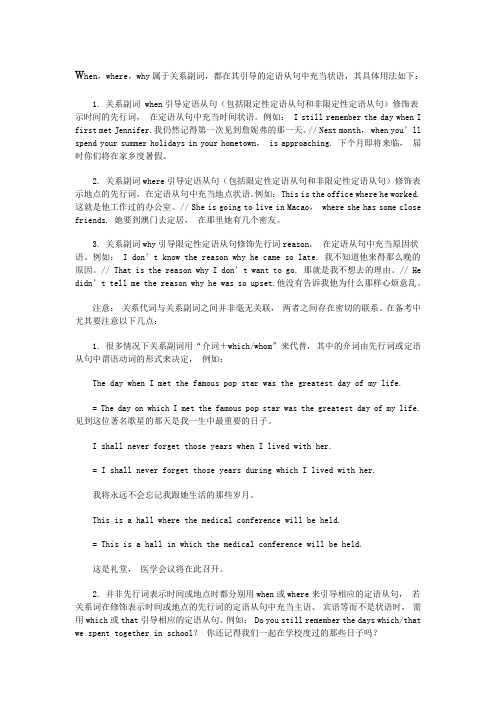
w hen,where,why属于关系副词,都在其引导的定语从句中充当状语,其具体用法如下:1. 关系副词 when引导定语从句(包括限定性定语从句和非限定性定语从句)修饰表示时间的先行词,在定语从句中充当时间状语。
例如: I still remember the day when I first met Jennifer.我仍然记得第一次见到詹妮弗的那一天。
// Next month,when you’ll spend your summer holidays in your hometown, is approaching. 下个月即将来临,届时你们将在家乡度暑假。
2. 关系副词where引导定语从句(包括限定性定语从句和非限定性定语从句)修饰表示地点的先行词,在定语从句中充当地点状语。
例如: This is the office where he worked. 这就是他工作过的办公室。
// She is going to live in Macao, where she has some close friends. 她要到澳门去定居,在那里她有几个密友。
3. 关系副词why引导限定性定语从句修饰先行词reason,在定语从句中充当原因状语。
例如:I don’t know the reason why he came so late. 我不知道他来得那么晚的原因。
// That is the reason why I don’t want to go. 那就是我不想去的理由。
// He didn’t tell me the reason why he was so upset.他没有告诉我他为什么那样心烦意乱。
注意:关系代词与关系副词之间并非毫无关联,两者之间存在密切的联系。
在备考中尤其要注意以下几点:1. 很多情况下关系副词用“介词+which/whom”来代替,其中的介词由先行词或定语从句中谓语动词的形式来决定,例如:The day when I met the famous pop star was the greatest day of my life.= The day on which I met the famous pop star was the greatest day of my life.见到这位著名歌星的那天是我一生中最重要的日子。
英语三大从句语法讲解

英语三大从句在英语中,主要有三大从句,即名词性从句包括主语从句,宾语从句,表语从句,同位语从句、形容词性从句即定语从句、副词性从句即状语从句,包括时间、条件、结果、目的、原因、让步、地点、方式等;定语从句一、关系代词引导的定语从句关系代词代替前面的先行词,并且在定语从句中充当句子成分,可以作主语、宾语、定语等;常见的关系代词有:who, that, which;它们的主格、宾格和所有格如下表所示:一关系代词who, whom和 whose的用法who代替人,是主格,在定语从句中作主语;An architect is a person who designs buildings. 建筑师是设计房屋的人;whom代替人,是宾格,在定语从句作宾语,在非正式英语常可省略;Do you know the gentleman whom we met in the school library yesterday 昨天我们在学校图书馆里遇到的那位先生你认识吗whose一般代替人,有时亦可代替物,是所有格,在定语从句作定语;The girl student whose father is a senior engineer used to study abroad. 其父是一位高级工程师的那个女学生过去在国外留学;Do you know the name of the hotel whose window we can see here 我们这儿能看到窗户的那个宾馆叫什么名字,你知道吗关系代词whose指代先行词hotel,正式用法应该用of which;whose window=the window of which,意思是:the window of the hotel;二关系代词which的用法which代替物,在定语从句作主语或宾语,作宾语时还可省略;I do not like stories which have unhappy endings.我不喜欢有不幸结局的小说;which可以换成that三关系代词that的用法that既可指人又可指物,在当代英语中大多指物,在定语从句作主语或宾语,作宾语时还可省略;: Is she the girl that sells newspapers她是卖报纸的那个女孩吗that可以换成whoWhere is the ice-cream that was in the fridge放在冰箱的冰激凌哪儿去了that可以换成whichIs this the book that you want to buy这是你要买的那本书吗 that可以换成which,在定语从句作宾语,还可以省略二、关系副词引导的定语从句常用的关系副词只有三个:when, where, why,在定语从句中充当时间、地点和原因状语;一关系副词when的用法关系副词when代替的先行词表示的是时间,when在定语从句作时间状语;In Beijing July and August are the months when it rains very often.北京的七月和八月是常下雨的月份;when先行词是months二关系副词where的用法关系副词where代替的先行词表示的是地点,where在定语从句作地点状语;During the Spring Festival I went back to the town where I was brought up.春节期间,我回到了生我养我的家乡;where的先行词是town三关系副词why的用法关系副词why代替的先行词表示的是原因,why在定语从句作原因状语;The reason why I am phoning you is to ask you whether you have got my email.我打电话给你的原因是想问问你是否收到了我的电子邮件;why先行词是reason, 当代英语里why可以用that替代,这时关系代词that就变成了表示原因的关系副词,还可以将why省略三、特殊关系代词as引导的定语从句一在固定搭配as…as, so…as, such…as, the same…as中,as引导定语从句You may take as many books as you want.你想要拿多少书就拿多少;第一个as是副词,修饰many的;第二个as才是关系代词,代替先行词books,在定语从句中作宾语二独立于主句之外,as引导定语从句As we know/ As is known to us, the earth turns around the sun. 正如我们所知,地球围绕太阳旋转;As we know和 As is known to us均为定语从句,as分别作宾语和主语,替代后面的主句;Taiwan is, as you know, an inseparable part of China.你知道,台湾是中国不可分割的一部分;关系代词as指代整个主句,在定语从句中作宾语;四、关系代词who, which与that的区别一关系代词who与that的区别1. 当关系代词用作主语时,多用主格who;He who loses hope loses all.失去希望的人就失去一切;先行词为代词he, they, any, all, one等时,多用whoI met Alice, who told me that she was learning Chinese.我遇见艾丽斯,她告诉我她在学汉语;在非限制性定语从句中,用who2. 当关系代词用作介词后的宾语时,用宾格whom,不用that;The man to whom our headmaster talked just now is our English teacher.我们校长刚才与他谈话的那个人是我们的英语老师;介词与关系代词紧密相连时,只能用宾格whom,不可用主格who注意:介词与关系代词不是紧密相连时,或者说介词放在句子后面时,这时可以用主格who,也可用that,还可以省略关系代词;因此,上面的这句话还可以有如下四种说法:1 The man whom our headmaster talked to just now is our English teacher.2 The man who our headmaster talked to just now is our English teacher.3 The man that our headmaster talked to just now is our English teacher.4 The man our headmaster talked to just now is our English teacher.3. 当关系代词泛指人时,多用that;He is a man that is never afraid of failure.他是个从不怕失败的人;that用来泛指人4. 当关系代词出现在who开头的疑问句时,应用that;例如:Who is the girl that is talking to Tom in English用英语同汤姆交谈的那个女孩是谁避免重复使用who,以免造成误解或语义含混不清二关系代词which与that的区别1. 当先行词为all, much, little以及不定代词anything, something, everything等时,关系代词多用that;All that glitters is not gold. 闪闪发光物,未必尽黄金;She told me everything that she knew. 她把她所知道的一切都告诉了我;2. 当先行词的前面有形容词最高级、序数词或限定词the only, the very, all, every, any, no 等时,关系代词一般都用that;This is the best novel that I have ever read. 这是我读过的最好的一部小说;He is the only person that has been invited to the ball. 他是惟一应邀参加舞会的人;3. 当关系代词出现在which开头的疑问句时,应用that;Which was the hotel that was recommended to the foreign guest 哪一个是推荐给外宾的宾馆这里使用that很明显是为了避免重复which4. 在非限制性定语从句中,关系代词一般只用which;Beijing, which is the capital of the People’s Republic of China, will host the 2008 Olympic Games. 北京是中华人民共和国的首都,将主办2008年奥运会;5. 介词后的关系代词用which,而不用that;She has collected 600 stamps, 60% of which are German stamps. 她收集了600张邮票,其中60%是德国邮票;五、定语从句的位置如前所述,定语从句一般总是直接置于所修饰的名词或代词之后;有时候,定语从句与先行词之间插入了其他的短语,这样它们被分隔了,这种情况下的定语从句被称作隔离定语从句;There was a girl upstairs who was shouting and crying, obviously mad.楼上有一个女孩,大喊大叫;很明显,她疯了;定语从句who was shouting and crying修饰the girl,被upstairs所隔开A new master will come tomorrow who will teach you German.明天要来一位新老师教你们德语了;定语从句置于句末以示强调名词性从句宾语从句一、引导词1由that 引导的陈述句性的宾语从句,在很多动词如say, think, wish , hope, see, believe, agree, expect, hear , feel等动词后;连词that只起连接作用,在从句中不做句子的成分,也无词汇意义,在口语中常被省略;如:I told him that he was wrong.在think, believe, suppose, expect等动词引起的宾语从句中,有时谓语尽管是否定意义,却不用否定形式,而将think 等动词变为否定形式;见语法:否定转移如:I don’t think you are right. 我认为你做的不对在许多带有复合宾语的句子中,that引导的宾语从句经常移到句子的后面,而用it做形式宾语;We think it wrong that he told a lie to everyone 我认为他向每一个人撒谎是错误的2 由连词if、 whether 引导的表示“是否…”的宾语从句;Whether, if 在从句中不做句子的成分,一般情况下,whether和if 可以替换;I don’t know if/whether he will come tomorrow.在介词后面的宾语从句中不用if引导Everything depends on whether we have enough money.宾语从句中有or not时不用if引导.I don’t know whether the movie star will come or not.和不定式连用作宾语时不用if引导Whether to go there or not hasn’t been decided.3由wh-引导的宾语从句;连接代词who, whom, whose, what, which和连接副词when, where, why, how 等连接的宾语从句,它们在句中即有连接从句的作用,又在句中充当句子的成分;Do you know which film they are talking about which做定语I don’t know where he lives. where 做地点状语二、宾语从句的语序,宾语从句的语序必须是陈述语序,既连接词+主语+谓语+其他成分 I believe that they will come soon.特例:有下列常见的问句,作为从句出现,是“不改变语句顺序”的;1. What's the matter2. What's wrong3. What's up4. What's the problem5. What's your trouble三、宾语从句的时态;宾语从句的时态受主句的限制,即:主句是一般现在时态,从句根据实际情况而定;主句是一般过去时态,从句用相应的过去的时态;如果从句的动作发生在主句之前,则从句要用过去完成时态;1 She says that she is a student.→ She said that she was a student.2She says that she will fly to Japan in a week. → She said that she would fly to Japan in a week.3She says that she has finished her homework alre ady. → She said that she had finished her homework already.1如果宾语从句说的是客观真理、自然现象或事实时,这时宾语从句要用一般现在时态;The teacher said that the earth goes round the sun.2Could you tell me…是用来征询对方的意见,语气委婉,并不表示过去;Could you tell me when we will visit the History Museum注意事项:3由陈述句变成宾语从句时,要注意人称的变化;She said: “I have been to England before.” → She said that she had been to England before. She asked me: “Do you like maths” → She asked me if I liked maths.4宾语从句与简单句的交换;由连接代词和连接副词引导的宾语从句,如果宾语从句的主语和主句的主语是同一个人时,可以用“疑问词+不定式”做宾语的简单句结构;I don’t know what I should do next. → I don’t know what to do next.DO SOME EXERCISES:you see AA. what he’s readingB. what is he readingC. what does he readD. he reads what2. Does Jack come from Japan Do you know合并成一个句子Do you know ___that__Jack __come___from Japandid your son say in the letter_He told me that he_D__ the Disney the next day.A. will visitB. has visitedC. is going to visitD. would visit4. He didn’t know___A____A. what’s the matterB. what the matter isC. what was the matterD. what the matter was5. Somebody called you just now, but I didn’t know__D__A. who were theyB. who they wereC. who was itD. who it was6. I want to know___D__A. what is his nameB. what’s his nameC. that his name isD. what his name is7. ---Could you tell me __C__she is looking for---Her cousin, Susan.A. thatB. whose C .who D. which8. ---What are you searching the Internet for---I’m trying to find out____.A. What is the difference between SARS and BIRDFLUB. How many persons have died in IraqC. How to protect our environmentD. Why is our Chinese team be able to beat Korea同位语从句一一般来说,在主从复合句中,用作同位语的从句叫同位语从句;它通常跟在某些名词之后,用以说明或解释该名词表示的具体内容;可以跟同位语从句的名词通常有:advice, decision, fact, hope, idea, information, message, news, promise, proposal, reply, report, suggestion, word消息,problem, question, doubt, thought等;eg: They were delighted at the news that their team had won.当听到他们队获胜的消息时,他们欣喜若狂;有时同位语从句可以不紧跟在被说明的名词后面,而被别的词隔开; 如:The thought came to him that Tom might have returned the book.他突然想起汤姆可能已经还了书了;二引导词1. The news that Mr. Li will be our new English teacher is true.2. He hasn’t made the decision whether he will go there.3. The question who should do the work is being discussed at the meeting.4. I have no idea what the boy is doing in the next room now.5. We haven’t yet settled the question where we are going to spend our summer vacation this year.6. I have no idea how I can get to the railway station.7. I have no idea when he will be back.小结:① that引导同位语从句时无词义,也不充当任何成分,但通常不可以省略,如句1;② whether引导同位语从句时意为“是否”,通常不能用if来代替, 如句2;③ 连接代词who, what等可以引导同位语从句,如句3, 4;④ 连接副词where, how, when等可以引导同位语从句, 如句5,6,7;三 that 引导的同位语从句和定语从句① 意义不同:同位语从句用来进一步说明前面名词的内容;而定语从句用来修饰、限定前面的先行词;试比较:1. The news that our team has won the final match is encouraging.2. The news that you told us is really encouraging.② that的功能不同:that引导同位语从句时是一个纯连词,不充当任何成分;而引导定语从句时,不仅起连接作用,而且还指代先行词并在从句中充当主语、宾语等成分;试比较:1. Dad made a promise that he would buy me a CD player if I passed the English test.2. Dad made a promise that excited all his children.③ 可否省略:that在引导同位语从句时,通常不可省略;在引导定语从句时,若在从句中作宾语,通常可以省略,若作主语则不可以省略;DO SOME EXERCISES:I. 请用适当的词填空,使下列句子意思完整;1. They expressed the hope _that_ they would come over to China soon.2. The fact ___that____ he didn’t see Tom this morning is true.3. Word has come __where_____ some American guests will come to our college for a visitnext week.4. He can’t answer the question ___how____ he got the money from his home yesterday.5. Do you have any idea __what___ is actually going on in the classroom6. The problem _______ we should have the meeting in the hall now must be decided at once. II. 下列各句中均有一处错误,请改正;1. Our team has won the game, that made us very happy.2. I’ve come with a message from Mr Wang how he won’t be able to see you this afternoon.3. He must answer the question if he agrees with what she said or not.4. I’ve read the book where you gave me the day before yester day.5. One of the men heldthe opinion when what the book said was right.表语从句表语从句只能置于主句之后,而主句的动词只能是连系动词;名词性从句在be等系动词后作表语时被称为表语从句The problem is how we can get the things we need.问题是我们怎样能弄到我们需要的东西;how 在表语从句中充当方式状语The scissors are not what I need. 这把剪刀不是我所需要的;what 在表语从句中充当宾语What I told him was that I would find him a good play. 我告诉他的是我会给他找个好剧本;what 在主语从句中作直接宾语, that作为表语从句的引导词在该表语从句中不充当句子成分, 不能省略That is what I want to tell you.那就是我想要对你讲的;what在表语从句中充当直接宾语That is why she failed to pass the exam. 那就是她考试不及格的原因;why 在表语从句中充当原因状语“That is why...”是常用句型, 意为“这就是……的原因/因此……”, 其中why引导的名词性从句在句中作表语, 该句型通常用于针对前面已经说明过的原因进行总结下面是两个与“That is why...”形式相似的结构, 它们与“That is why...”结构之间的关系要能够辨析清楚:1“That is why...”与“That is the reason why...”同义, 只不过从语法结构上讲, “That is the reason why...”中why引导的是—个定语从句, 将其中的the reason去掉则与“That is why...”结构一样 That is the reason why I cannot agree.2“That is because...”句型中从属连词because引导的名词性从句在此作表语, 这也是个常用句型, 意为“这就是为什么……/因为……”;“That is because...”与“That is why...”之间的不同在于“That is because...”指原因或理由, “That is why...”则指由于各种原因所造成的后果He did not see the film last night. That is because he had to help his little sister with her homework.昨天晚上他没有去看电影, 那是因为他得帮助他的妹妹做作业;第一句话说明结果, 第二句话说明原因He had seen the film before. That is why he did not see it last night.他以前曾看过那部电影, 因此他昨天晚上没有去看;第一句话说明原因, 第二句话说明结果考题1The traditional view is ____ we sleep because our brain is “programmed” to make us do so. 2007上海A. whenB. whyC. whetherD. that考题2You are saying that everyone should be equal, and this is ____ I disagree. 2004A. whyB. whereC. whatD. how考题3— I drove to Zhuhai for the air show last week.— Is that ____ you had a few days off 1999A. whyB. whenC. whatD. where考题4____ made the school proud was ____ more than 90% of the students had been admitted to key universities. 2003上海春A. What; becauseB. What; thatC. That; whatD. That; because考题5—Are you still thinking about yesterday’s game—Oh, that’s ____. 2003北京春A. what makes me feel excitedB. whatever I feel excited aboutC. how I feel about itD. when I feel excited表语从句与宾语从句的关系宾语从句和表语从句都属于名词性从句;其作用跟名词在句中的作用相同;故充当宾语的句子叫宾语从句,充当表语的句子叫表语从句;宾语从句1对于宾语从句要掌握以下三点①语序: 从句的语序必须是陈述句语序, 即“主语 + 谓语”这种形式;②时态: 当主句是一般现在时或一般将来时的时候, 从句可以是任何时态, 而当主句是一般过去时的时候, 从句时态必须是过去时范围的时态, 即一般过去时, 过去进行时, 过去完成时, 过去将来时;③连接词: 当从句意思完整, 主句意思肯定时, 连接词用that, 且可以省去当从句意思完整, 主句意思不确定或含否定含意时, 常用if或whether是否当从句意思不完整时, 连接词则是代替不完整部分的特殊疑问词;表语从句在句子中起表语作用的从句叫做表语从句,位于主句系动词的后面;表语从句的引导词和主语从句的引导词相同;也是名词性从句的一种;What the police want to know is when you entered the room.警察想知道的是你什么时候进的房间;The trouble is that we are short of funds困难是我们缺乏资金;This is what we should do这是我们应当做的;That is why I want you to work there那就是我要你在那儿工作的原因;His first question was whether Mr. Smith had arrived yet他的第一个问题是史密斯先生到了没有; 从句中的疑问句用正常语序,即陈述语序;as if, as though, because也可用来引导表语从句;She seems as if she had done a great thing她看起来好像做了一件大事;It is because you eat too much那是因为你吃得太多了;状语从句一状语从句的种类1.时间状语从句2.地点状语从句;3.原因状语从句;4.条件状语从句;5.目的状语从句;6.让步状语从句;7比较状语从句;8.程度状语从句;9.方式状语从句;10.结果状语从句;二状语从句的时态一般情况下,时间和条件状语从句的谓语动词一般用“一般现在时”表示“一般将来时”,用“现在完成时”表示“将来完成时”;1时间状语从句1.由when, while, as引导的时间状语从句;when, while和as的区别:when引导的从句的谓语动词可以是延续性的动词,又可以是瞬时动词;并且when有时表示“就在那时”;While引导的从句的谓语动作必须是延续性的,并强调主句和从句的动作同时发生或者相对应;并且while有时还可以表示对比;While my wife was reading the newspaper, I was watching TV.As表示“一边……一边”,as引导的动作是延续性的动作,一般用于主句和从句动作同时发生;as也可以强调“一先一后;As we was going out, it began to snow.当我们出门时,开始下雪了;as强调句中两个动作紧接着先后发生,而不强调开始下雪的特定时间2.由before和after引导的时间状语从句;before引导的从句不再用否定式的谓语,并且当before引导的从句位于主句之后,有时译成“就,才”; 时态:当主句用将来时,从句总是用现在时;如果before引导的从句谓语用的是过去时,则主句动词多用过去完成时,这样以便体现动作发生的先后;After表示主句动作发生在从句动作之后;主句和从句的动作的时间关系正好与before引导的从句相反;3.由till或until引导的时间状语从句;till和until一般情况下两者可以互换,但是在强调句型中多用until;并且要注意的是:如果主句中的谓语动词是瞬时动词时,必须用否定形式;如果主句中的谓语动词是延续性动词时,用肯定或否定形式都可以,但表达的意思不同;4.由since引导的时间状语从句;since引导的从句的谓语动词可以是延续性的动词,又可以是瞬时动词;一般情况下,从句谓语动词用一般过去时,而主句的谓语动词用现在完成时;但在It is +时间+since从句的句型中,主句多用一般现在时;5.由as soon as, immediately, directly, instantly, the moment, the instant, the minute, 等引导的时间状语从句;这些连词都表示“一……就”;hardlyscarcely, rarely…when / before, no sooner…than相当于as soon as之意;主句用过去完成时,从句用一般过去时;当hardly, scarcely, rarely和no sooner位于句首时,主句应用倒装语序;6.由by the time引导的时间状语从句;时态的变化:在一般情况下,如果从句的谓语动词用一般过去时,主句的谓语动词用过去完成时;如果从句的谓语动词用一般现在时,主句的谓语动词用将来完成时;7.由each time, every time和whenever引导的时间状语从句;8.由as long as和so long as引导的时间状语从句;这两个连词表示“只要;和…一样长”;2地点状语从句地点状语从句一般由连接副词where, wherever等引导,已经形成了固定的句型,:句型1:Where+地点从句,there+主句;此句型通常译成“哪里……哪里就……”;主句在从句后面时,there可用可不用;如果主句在从句的前面时,一般都不用there;句型2:Anywhere/ wherever+地点从句,+主句;状语从句是句子的状语由一个从句充当,来修饰主句中的动词,形容词或副词等;状语从句都由从属连词引导,与主句连接,放在句末时,一般不在前面加逗号;3原因状语从句: because, since, as和for都表示原因;because语势最强,回答why提出的问题,用来说明人所不知的原因;当能够很明显的看出原因或人们已知原因,就用as或since;由because引导的从句如果放在句末,且前面有逗号,则可以用for来代替;但如果不是说明直接原因,而是多种情况加以推断,就只能用for;4目的状语从句:表示目的状语的从句可以由in order that, so that,等词引导;5结果状语从句:结果状语从句常由so...that 或 such...that引导,首先要了解so和such后面分别跟什么词;such是形容词,修饰名词或名词词组,so是副词,只能修饰形容词或副词;so 还可与表示数量的形容词many, few, much, little连用,形成固定搭配;The box is so heavy that I can't carry it.6让步状语从句:是由though, although 引导的状语从句;。
定语从句句式

定语从句句式定语从句定义:在复合句中修饰名词或代词的从句;被修饰的名词或代词叫先行词。
种类:关系代词:who、whom、whose、which、that关系副词:where、when、why准关系代词:as、but、than复合关系代词:what、whatever、whoever、whichever一、关系代词引导的定语从句(1)由who引导的定语从句:1.关系代词who用作主语,指人或动物;2.who;不能用作表语;(2)由who引导的定语从句:1.关系代词whom用作宾语,指人;2.whom不能用作表语;(3)由whose引导的定语从句:1.关系代词whose作定语,既可指人也可指物。
2.whose用于引导定语从句时,有“whose=of which”(4)由which引导的定语从句:1.关系代词做主语、谓语动词或介词的宾语,指物或动物;2.常用关系代词which作表语,既可指人也可指物,“人”要具有某种特性;3.which既能引导限制性定语从句,也能引导非限定性定语从句;(5)由of which/whom引导的定语从句:1.名词、不定代词、数量词+of which/whom2. of which/whom从句中作主语有两种形式:数词、名词+of which/whom 或of which/whom+数词、名词3.“名词+of which”做主语时常用“whose+名词”取代;4.of which所修饰的名词前应加上定冠词;(6)由介词+which+抽象名词引导的定语从句:1.在非限制性定语从句中,以“介词+which+抽象名词”结构补充说明,which作定语;2.the way后接定语有三种形式:不加;加that;加in which;(7)由that引导的定语从句:1.关系代词that在从句中作主语或宾语,不作介词宾语,既指人也指物;2.先行词是不定代词时,必须用that引导定语从句;3.先行词被不定代词修饰时,必须用that引导定语从句;4.先行词被序数词或形容词最高级修饰时,必须用that引导定语从句;5. 先行词既有人又有物时,必须用that引导定语从句;6. 先行词被the only、the same、the last修饰时,必须用that 引导定语从句;7.以who、which引起的问句中,为避免重复,常用that引导定语从句;8.用作关系副词以修饰表示时间的名词时,常用that代替when 引导定语从句;9.构成非限制性定语从句时,不用that;10关系代词前有介词且指物时,不用that;11.先行词本身是that时,不用that;12.关系代词之后有插入成分时,不用that;二、关系副词引导的定语从句(1)由when的定语从句:1.关系副词when是兼有连词作用的副词,常用于表示时间;2.先行词为表示时间的名词;3在口语中,先行词为表示时间的名词时,可以省略when;4先行词在从句中起副词作用作时间状语时,用when引导定语从句;先行词在从句中起代词作用作宾语时,用which/that引导定语从5.在this/that/it’s后可省略先行词the time;6.现代英语口语中,the day when、the time when、the moment when可用that代替;;7.关系副词when可用恰当的“介词+which”代替;(2)由where引导的定语从句:1. 关系副词where是兼有连词作用的副词,常用于表示地点;2.先行词为表地点或有地点含义的抽象名词;3.在口语中,先行词是place、room等词时,可以省略where;4.先行词在从句中起副词作用作地点状语时,用where引导定语从句;先行词在从句中起代词作用作宾语时,用that/which引导定语从句;5. 在this/that/it’s后可省略先行词the place;6. 现代英语口语中,the place where可用the place that代替;7. 关系副词where可用恰当的“介词+which”代替;(3)由why引导的定语从句:1. 关系副词why兼有连词作用的副词,常用于表示原因;2.先行词只有reason;3.在口语中,可以省略why;4.先行词reason在从句中起副词作用表原因时,用why引导定语从句;先行词reason在从句中起代词作用作宾语时,用that/which引导定语从句;5.在this/that/it’s后可省略先行词the reason;6.现代英语口语中,the reason why可用the reason that代替;7. 关系副词why可用恰当的“介词+which”代替;(4)由介词+where/when引导的定语从句:1.from where引导的定语从句中,where代表主句提供的地点;2.since/by when引导的定语从句中,when代表主句提供的时间三、准关系代词引导的定语从句(1)由准关系代词as引导的限制性定语从句:1.as既可作引导状语从句的连词,也可作引导定语从句的关系代词;2.在such…as引导的定语从句中,as在从句中作主语或表语;3.在the same…as引导的定语从句中,as在从句中作主语或宾语;4.在as…as引导的定语从句中,as在从句中作主语;5.区别:such…as引导定语从句,such…that引导结果状语从句;6.区别:the same…as指两物相似,the same…that描述的是同一物;(2)由准关系代词as引导的非限制性定语从句:1.as代表主句或主句一部分的意思,不能指代某个名词或代词;2.在as引导的非限制性定语从句中,as可以放在主句的任意位置,在从句中作主语或宾语;3.主句表否定,as引导的定语从句位于主句之后时,as指代的主句不表否定,可用but代替;4.主句表否定,as引导的定语从句位于主句之前时,as指代的主句仍表否定意义;5非限制性定语从句中,which引导的从句不能放在主句前,as 引导的从句可放在主句前后.;6.非限制性定语从句中,as/which用作关系代词时都可指代一个句子,但as有“就像”之意;7.非限制性定语从句中,当从句的谓语动词时be动词或连系动词时,as/which都可作主语;8.非限制性定语从句中,当从句的谓语动词是行为动词时,只能用which作主语;9.非限制性定语从句中,as可作连词引导状语从句,构成“as+过去分词”形式,表定语义;(3)由准关系代词but引导的定语从句:1.but本身含有否定义,相当于who/which/that…not;2.but的先行词往往是有否定义的代词或名词词组,通过双重否定表强烈肯定;3.but用于定语从句中作主语,此时谓语动词的数要与先行词一致,时态要与主句一致;4.but用于引导状语从句时,有“but=that...not”(4)由准关系代词than引导的定语从句:1.than引导的定语从句中,谓语动词的数和时态必须与被比较级修饰的先行词一致;2.than引导的状语从句中,用作连词的than可兼作关系代词在主句中作主语,than指代主句;3.than引导的状语从句中,构成“than+过去分词”结构,than 后省略了形式主语it、动词be;四、复合关系代词引导的定语从句(1)复合关系代词what引导的定语从句:1.定语从句中,what是由先行词和关系代词组成的复合词,是兼作先行词的关系代词;2.what用于指人时,what=the person that;what用于指物时,what=the thing(s) which;3.what在定语从句中起名词作用时,可作主语、宾语、表语;4.what在定语从句中起形容词作用时,修饰名词,意为“仅有的”;5.what在定语从句中起形容词作用时,常与few、little连用,意为“尽管不多,但已全部”;6.what引导的名词性从句中,无疑问义,可作从句的主语、宾语、介宾、宾补;7.what用于表比喻义的特殊结构:A is to B what C is to D;8.what组成的常用短语:What if…? 如果…怎么样?What of it?那又怎么样?(2)复合关系代词whoever,whomever,whichever,whatever引导的定语从句:1.whoever、whomever、whichever、whatever具有名词功能,引导名词性从句;2.whoever、whomever、whichever、whatever指代未知的人或物,在从句中作主语或宾语;3.whichever、whatever在名词性从句中兼起形容词作用,修饰从句中名词,意为“仅有的”;4. whoever、whichever、whatever在名词性从句中兼起副词作用,引导让步状语从句;五、关系代词的省略1.当关系代词在定语从句中作宾语时往往省略;2.当关系代词在定语从句中作表语时,用that且往往省略;3.当先行词为不定代词时,往往不用关系代词;4.当定语从句为there be句型时,往往不用关系代词;5.当主句为there be句型时,实际主语后若带有定语从句,作主语的关系代词有时省略;六、插入语(1)分句用作插入语:I believe、I find、I hear、I imagine、I remember、I think、I sup pose…(2)状语分句作插入语:1.可作插入语的状语分句有:as far as I know、as I told you before、if you like…2.省略形式的状语分句作插入语:if ever、if possible、if any…(3)what构成的惯用插入语:1.“what+be+比较级形容词”结构,意为“而且,尤有甚者“;2.“what we call,what is called”,意为“所谓的”;3.“what+…”的类似结构:what we consider、what you refer to as、what is referred to as…例句:This is the man who helped me.(who在从句中作主语)The doctor whom you are looking for is in the room.(whom 在从句中作宾语)Do you see the house whose windows are all broken?(whose在从句中作定语)The building which stands near the river is our school.(which在从句中作主语)This is the book (which) you want.(which在从句中作谓语动词的宾语)The room in which there is a machine is a workshop.(which 在从句中作介宾)The war killed 1000 people, most of which were very young.(“不定代词+of which”的形式)The committee consists of 20 members, five of whom are women.(“数量词+of whom”的形式)Do you see the house the windows of which are all broken?(“名词+of which”作主语结构之一)Do you see the house of which the windows are all broken? (“名词+of which”作主语结构之二)It rained all night, during which time the ship broke in pieces.(“介词+which+抽象名词”结构)That’s the way (/) he spoke.(the way后接定语的形式之一)That’s the way that he did it. (the way后接定语的形式之二) That’s the way in which you answered the question. (the way后接定语的形式之三)。
关系副词引导的定语从句详解

关系副词引导的定语从句详解关系副词引导的定语从句详解英语(English)是一种西日耳曼语支,最早被中世纪的英国使用,并因其广阔的殖民地而成为世界使用面积最广的语言。
下面是店铺为大家整理的关系副词引导的定语从句详解,欢迎阅读与收藏。
关系副词引导的定语从句详解篇11、基本用法定语从句除可用关系代词引导外,还可用关系副词when, where与why来引导,它们的区别是:when用于指时间,where用于指地点,why用于指原因。
when, where, why 在定语从句中均用作状语。
如:1980 was the year when he was born. 1980是他的出生年。
This is the town where I was born. 这就是我出生的城市。
These are the reasons why we do it. 这些就是我们这样做的理由。
2、先行词问题关系副词when和where的先行词是表示时间(如the day, the days, the time, the year等)和地点(如the place, the house, the factory, the station等)的一类词,而关系副词why的先行词通常只是whythe reason(s)。
另外,when和where可引导限制性和非限制性定语从句,而why则只用于引导限制性定语从句,不用于引导非限制性定语从句。
3、一点注意注意不要以为在时间名词后就一定用关系副词when,在地点名词后就一定用关系副词 where,在表示原因的the reason后就一定用关系副词why。
到底选用关系副词还是关系代词,关键是看它们在定语是用作状语(用关系副词)还是用作主语或宾语(用关系代词)。
如:Don’t forget the time (that) I’ve told you. 不要忘记我告诉你的时间。
(that用作told的宾语)I’ll never forget the days when I worked with you. 我永远不会忘记我与你共事的日子。
英语语法之关系副词引导的定语从句

№.4英语语法之关系副词引导的定语从句关系副词是引导定语从句的一类词语,用于连接主句和从句,并在从句中充当状语。
常见的关系副词有:where、when、why。
1. Where(在哪里),用于引导地点状语从句,在从句中充当地点状语,以下是关于where的几点用法:(1)指代具体地点:- This is the school where I study.(这就是我学习的学校。
)- I often go to the caféwhere they serve delicious coffee.(我经常去那家咖啡馆,他们的咖啡很好喝。
)(2)指代抽象地点:- The library is where I find peace and quiet.(图书馆是我找到宁静的地方。
)- The park is where families gather on weekends.(公园是周末家庭聚集的地方。
)(3)表示定位或移动的地点:- He lives in a small town where everyone knows each other.(他住在一个小镇,每个人都互相认识。
)- We went hiking in the mountains where the air is fresh.(我们去了山区徒步旅行,那里空气清新。
)(4)引导限制性定语从句:- I found the book where I left it.(我找到了我放的书。
)- The house where he grew up has been demolished.(他长大的房子已经被拆除了。
)当使用where引导地点状语从句时,需要注意以下几点:(1)确定先行词:在使用where引导定语从句之前,要确保已经明确了先行词,即被修饰的名词或代词。
这样可以使从句更加清晰和连贯。
(2)引导限制性定语从句:where通常用来引导限制性定语从句,对先行词进行具体描述和限定,提供必要的信息。
定语从句 3 --- 关系副词

二、关系副词与关系代词的联系 关系副词的含义相当于“介词+ which/whom”结构
1. I shall never forget the day on which we first met. I shall never forget the day when we first met. 2. Beijing is the place in which I was born. Beijing is the place where I was born. 3. Is this the reason for which he refused our offer? Is this the reason why he refused our offer? when = on (in, at, during…) + which where = in (at, on…) + which why = for which
1. The library ______ ________ I often borrow books from which is not far from here. The library _______ I often borrow books is not far where from here. on which 2. Is this the bus ____ _______ you left your umbrella? Is this the bus ____________ you left your umbrella? where on _______ 3. October 1,1949 was the day _____ which the People’s Republic of China was founded . when October 1,1949 was the day __________ the People’s Republic of China was founded .
定语从句关系副词的用法

• 2. 若定语从句的先行词是时间,但定语 从句缺主语或宾语,则用which或that引 导定语从句。 • I’ll never forget the time that / which I spent on campus.
• I’ll never forget the time that/ which was spent with you.
知识拓展:
1. 关系副词where引导的定语从句可以转 换为“介词+which”引导的定语从句(这 个介词可以是at/in/on)。 例: 1)The hotel where we stayed wasn’t clean. =The hotel at which we stayed wasn’t clean.
Practice
定语从句的翻译:
April Fool’s Day is a day when people play jokes on friends
愚人节是__________________________ 日子。 人们可以和朋友开玩笑的
七月一日是(他出生的)日子。 19451st 年是 (二战结束的 ) 时间。 July is the day _________________. when he was born 我永远忘不了 (第一次来深圳的 )那一天。 The year 1945 was the time__________ when the _______________________. Second World War the ended. when I first I will never forget day ___________ came to Shenzhen. ________________________.
定语从句中的关系代词和关系副词

定语从句中的关系代词和关系副词定语从句是英语语法中一个重要的概念,用于修饰或限制一个名词。
在定语从句中,关系代词和关系副词起着关键的作用。
本文将详细介绍关系代词和关系副词的用法和特点,并通过例子来说明。
一、关系代词(Relative Pronouns)关系代词用来引导定语从句,用于连接主句和从句,同时在从句中充当名词的作用。
常见的关系代词有:that, which, who, whom, whose。
1. that: 可以指代人或物,用来引导限制性定语从句,即从句中的信息是必需的。
例句:- I bought a book that is very interesting.(我买了一本非常有趣的书。
)2. which: 只能指代物,用来引导非限制性定语从句,即从句中的信息是附加的。
例句:- My car, which is red, was stolen yesterday.(我的车,它是红色的,昨天被偷了。
)3. who: 只能指代人,用来引导限制性定语从句,即从句中的信息是必需的。
例句:- The woman who is sitting over there is my teacher.(那个坐在那里的女人是我的老师。
)4. whom: 只能指代人,用来引导非限制性定语从句,即从句中的信息是附加的。
例句:- The girl, whom I met yesterday, is a famous actress.(那个我昨天见到的女孩是位著名的演员。
)5. whose: 可以指代人或物,引导定语从句,表示所属关系。
例句:- I have a friend whose father is a doctor.(我有一个朋友,他的父亲是个医生。
)关系代词的选择要根据其先行词的性质来确定,同时需要注意该从句在整个句子中的成分。
二、关系副词(Relative Adverbs)关系副词也是引导定语从句的一种形式,它们在从句中充当副词的作用。
关系副词引导定语从句的注意事项
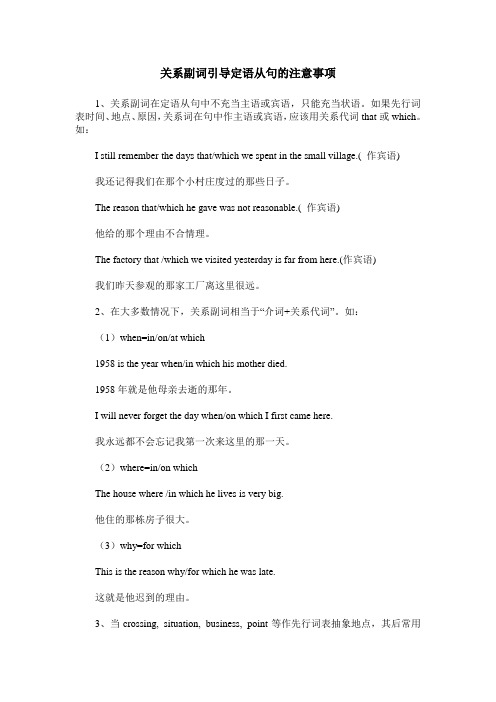
关系副词引导定语从句的注意事项1、关系副词在定语从句中不充当主语或宾语,只能充当状语。
如果先行词表时间、地点、原因,关系词在句中作主语或宾语,应该用关系代词that或which。
如:I still remember the days that/which we spent in the small village.( 作宾语)我还记得我们在那个小村庄度过的那些日子。
The reason that/which he gave was not reasonable.( 作宾语)他给的那个理由不合情理。
The factory that /which we visited yesterday is far from here.(作宾语)我们昨天参观的那家工厂离这里很远。
2、在大多数情况下,关系副词相当于“介词+关系代词”。
如:(1)when=in/on/at which1958 is the year when/in which his mother died.1958年就是他母亲去逝的那年。
I will never forget the day when/on which I first came here.我永远都不会忘记我第一次来这里的那一天。
(2)where=in/on whichThe house where /in which he lives is very big.他住的那栋房子很大。
(3)why=for whichThis is the reason why/for which he was late.这就是他迟到的理由。
3、当crossing, situation, business, point等作先行词表抽象地点,其后常用where引导的定语从句。
如:I work in a business where almost everyone is waiting for the great chance.我在一家几乎人人都在等待发展机遇的大公司工作。
高中英语语语法知识点:关系副词引导的定语从句
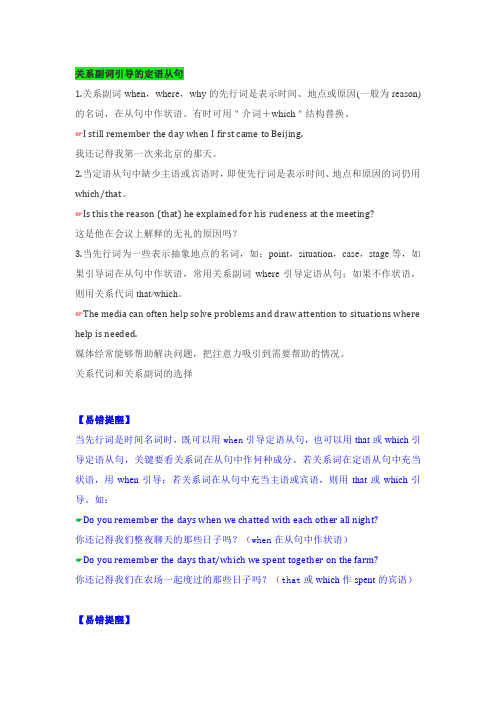
关系副词引导的定语从句1.关系副词when,where,why的先行词是表示时间、地点或原因(一般为reason)的名词,在从句中作状语。
有时可用"介词+which"结构替换。
☞I still remember the day when I first came to Beijing.我还记得我第一次来北京的那天。
2.当定语从句中缺少主语或宾语时,即使先行词是表示时间、地点和原因的词仍用which/that。
☞Is this the reason (that) he explained for his rudeness at the meeting?这是他在会议上解释的无礼的原因吗?3.当先行词为一些表示抽象地点的名词,如:point,situation,case,stage等,如果引导词在从句中作状语,常用关系副词where引导定语从句;如果不作状语,则用关系代词that/which。
☞The media can often help solve problems and draw attention to situations where help is needed.媒体经常能够帮助解决问题,把注意力吸引到需要帮助的情况。
关系代词和关系副词的选择【易错提醒】当先行词是时间名词时,既可以用when引导定语从句,也可以用that或which引导定语从句,关键要看关系词在从句中作何种成分。
若关系词在定语从句中充当状语,用when引导;若关系词在从句中充当主语或宾语,则用that或which引导。
如:☛Do you remember the days when we chatted with each other all night?你还记得我们整夜聊天的那些日子吗?(when在从句中作状语)☛Do you remember the days that/which we spent together on the farm?你还记得我们在农场一起度过的那些日子吗?(that或which作spent的宾语)【易错提醒】1. 当先行词为地点名词时,如果关系词在从句中作主语或宾语,则用that或which 引导。
高一英语定语从句---关系副词的用法(含例句及解析)
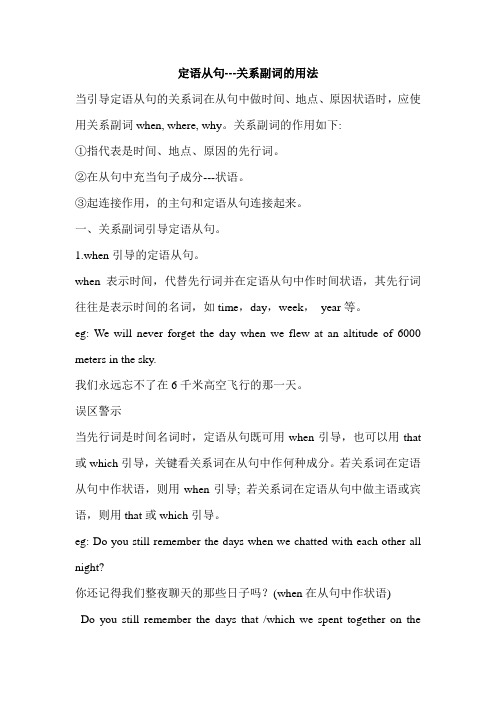
定语从句---关系副词的用法当引导定语从句的关系词在从句中做时间、地点、原因状语时,应使用关系副词when, where, why。
关系副词的作用如下:①指代表是时间、地点、原因的先行词。
②在从句中充当句子成分---状语。
③起连接作用,的主句和定语从句连接起来。
一、关系副词引导定语从句。
1.when引导的定语从句。
when表示时间,代替先行词并在定语从句中作时间状语,其先行词往往是表示时间的名词,如time,day,week,year等。
eg: We will never forget the day when we flew at an altitude of 6000 meters in the sky.我们永远忘不了在6千米高空飞行的那一天。
误区警示当先行词是时间名词时,定语从句既可用when引导,也可以用that 或which引导,关键看关系词在从句中作何种成分。
若关系词在定语从句中作状语,则用when引导; 若关系词在定语从句中做主语或宾语,则用that或which引导。
eg: Do you still remember the days when we chatted with each other all night?你还记得我们整夜聊天的那些日子吗?(when在从句中作状语)Do you still remember the days that /which we spent together on thefarm?你还记得我们在农场一起度过的那些日子吗?(that/which做spend的宾语)2.where引导的定语从句where表示地点, 代替先行词并在定语从句中做地点状语,其先行词往往是表示地点的名词,如place , factory,house, village等或表示抽象地点的名词,如position, point, case , stage,situation,atmosphere 等。
2020高三英语语法定语从句(关系副词)
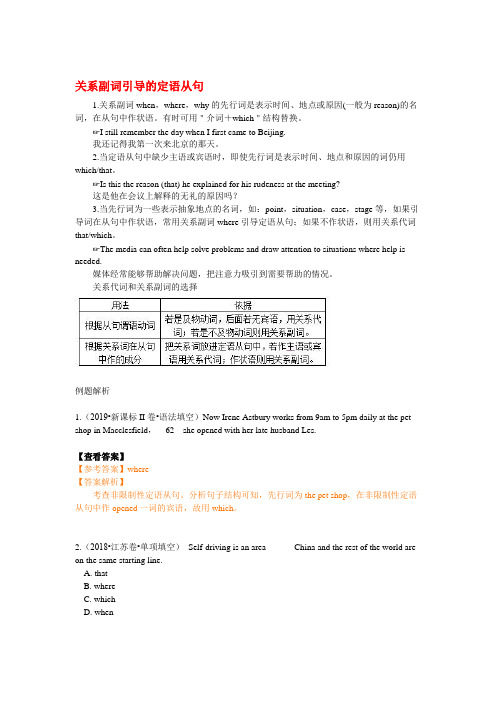
关系副词引导的定语从句1.关系副词when,where,why的先行词是表示时间、地点或原因(一般为reason)的名词,在从句中作状语。
有时可用"介词+which"结构替换。
☞I still remember the day when I first came to Beijing.我还记得我第一次来北京的那天。
2.当定语从句中缺少主语或宾语时,即使先行词是表示时间、地点和原因的词仍用which/that。
☞Is this the reason (that) he explained for his rudeness at the meeting?这是他在会议上解释的无礼的原因吗?3.当先行词为一些表示抽象地点的名词,如:point,situation,case,stage等,如果引导词在从句中作状语,常用关系副词where引导定语从句;如果不作状语,则用关系代词that/which。
☞The media can often help solve problems and draw attention to situations where help is needed.媒体经常能够帮助解决问题,把注意力吸引到需要帮助的情况。
关系代词和关系副词的选择例题解析1.(2019•新课标II卷•语法填空)Now Irene Astbury works from 9am to 5pm daily at the pet shop in Macclesfield,__62__she opened with her late husband Les.【查看答案】【参考答案】where【答案解析】考查非限制性定语从句。
分析句子结构可知,先行词为the pet shop,在非限制性定语从句中作opened一词的宾语,故用which。
2.(2018•江苏卷•单项填空)Self-driving is an area ______China and the rest of the world are on the same starting line.A. thatB. whereC. whichD. when【查看答案】【参考答案】B【答案解析】考查定语从句。
定语从句引导词的用法

定语从句引导词的用法定语从句引导词的用法定语从句,一个简单句跟在一名词或代词后进行修饰限定,就叫做定语从句。
下面是店铺分享给大家的定语从句引导词的用法,希望对大家有帮助。
1、定语从句:定语从句是由关系代词或关系副词引导的从句,其作用是作定语修饰主句的某个名词性成分,相当于形容词,所以又称为形容词性从句,一般紧跟在它所修饰的先行词后面.2、关系词:引导定语从句的关联词称为关系词,关系词有关系代词和关系副词.关系代词有that, which, who, whom, whose,as等;关系副词有where,when,why等.关系词常有3个作用:1,引导定语从句.2,代替先行词.3,在定语从句中担当一个成分.3、定语:定语用来限定、修饰名词或代词的,是对名词或代词起修饰、限定作用的词、短语或句子,汉语中常用‘……的’表示.主要由形容词担任.此外,名词,代词,数词,分词,副词,不定式以及介词短语也可以来担任,也可以由一个句子来担任.单词作定语时通常放在它所修饰的词之前,作前置定语.短语和从句作定语时则放在所修饰的词之后,作后置定语.(一)限定性定语从句1. that既可代表事物也可代表人,which代表事物;它们在从句中作主语或宾语,that在从句中作宾语时常可省略关系词,which在从句中作宾语则不能省略.而且,如果which在从句中作“不及物动词+介词”的介词的宾语,注意介词不要丢掉,而且介词总是放在关系代词which的前边,但有的则放在它原来的位置2. which作宾语时,根据先行词与定语从句之间的语义关系,先行词与which之间的介词不能丢3. 代表物时多用which,但在带有下列词的句子中用that而不用which,这些词包括当先行词是anything, everything, nothing ,few,all,none,little,some等不定代词时,或者是由every,any, all, some, no, little, few, much等修饰时等,这时的that常被省略还有先行词前有序数词或形容词最高级修饰时,或先行词就是序数词或最高级时.以及先行词中既有人又有物时.还有句中前面有which时,都只能用that4. who和whom引导的从句用来修饰人,分别作从句中的'主语和宾语,whom作宾语时,要注意它可以作动词的宾语也可以作介词的宾语5. where是关系副词,用来表示地点的定语从句6. when引导定语从句表示时间〔注〕值得一提的是,表示时间“time"一词的定语从句只用when引导,有时不用任何关系代词,当然也不用that引导By the time you arrive in London, we will have stayed there for two weeks. I still remember the first time I met her. Each time he goes to business trip, he brings a lot of living necessities,such as towers, soap, toothbrush etc.7. whose是关系代词,修饰名词作定语,相当于所修饰成分的前置所有格.它引导的从句可以修饰人和物,当它引导的从句修饰物体时,可以与 of which 调换,表达的意思一样.8. 当从句的逻辑主语是some,any,no,somebody,anybody,nobody,something,anything,everything或nothing时,常用there is来引导There is somebody here who wants to speak to you. 这里有人要和你说话.(二)非限定性定语从句非限定性定语从句的作用是对所修饰的成分作进一步说明,通常是引导词和先行词之间用逗号隔开,将从句拿掉后其他部分仍可成立1. which引导的非限定性定语从句来说明前面整个句子的情况或主句的某一部分2.当先行词是专有名词或物主代词和指示代词所修饰时,其后的定语从句通常是非限制性的,例如:Charles Smith,who was my former teacher,retired last year. 查理·史密斯去年退休了,他曾经是我的老师.My house,which I bought last year,has got a lovely garden. 我去年买的的那幢房子带着个漂亮的花园.This novel, which I have read three times, is very touching. 这本小说很动人,我已经读了三遍.3.非限制性定语从句还能将整个主句作为先行词,对其进行修饰,这时从句谓语动词要用第三人称单数,例如:He seems not to have grasped what I meant, which greatly upsets me. 他似乎没抓住我的意思,这使我心烦.Liquid water changes to vapor, which is called evaporation. 液态水变为蒸汽,这就叫做蒸发.4. 有时as也可用作关系代词5. 在非限定性定语从句中,不能用关系副词why和关系代词that,而用who, whom代表人,用which代表事物.;(三)关系代词引导的定语从句1.who指人,在从句中做主语(1) The boys who are playing football are from Class One.(2) Yesterday I helped an old man who lost his way.2. whom指人,在定语从句中充当宾语,常可省略.(1) Mr. Liu is the person (whom) you talked about on the bus.(2) Mr. Ling is just the boy whom I want to see.注意:关系代词whom在口语和非正式语体中常用who代替,可省略.如果在从句中做宾语,就用whom或who.比如: He is the man whom/who I talk to.如果是在从句中作主语就只能用who.比如: He is the man who has an English book.(3) The man who/whom you met just now is my friend3.which指物,在定语从句中做主语或者宾语,做宾语时可省略(1) Football is a game which is liked by most boys.(2) This is the pen (which) he bought yesterday.4. that指人时,相当于who或者whom;指物时,相当于which.在定语从句中做主语或者宾语,做宾语时可省略.(5) The number of the people that/who come to visit the city each year rises one million.(6) Where is the man that/whom I saw this morning?5. whose通常指人,也可指物,在定语从句中做定语(1) He has a friend whose father is a doctor.(2) I once lived in a house whose roof has fallen in.whose指物时,常用以下结构来代替(3) The classroom whose door is broken will soon be repaired.(4) The classroom the door of which is broken will soon be repaired.(5) Do you like the book whose color is yellow?(6) Do you like the book the color of which is yellow?(四)注意介词+关系代词引导的定语从句关系代词在定语从句中做介词宾语时从句常由介词+关系代词引导(1) The school (that/which) he once studied in is very famous.(2) The school in which he once studied is very famous.(3) Tomorrow I will bring here a magazine (that/which) you asked for.(4) Tomorrow I will bring here a magazine for which you asked.(5) We’ll go to hear the famous singer (whom/that/who) we have often talked about.(6) We’ll go to hear the famous singer about whom we have often talked.注意:1. 含有介词的动词短语一般不拆开使用,如:look for,look after, take care of等(1) This is the watch which/that I am looking for. (T=正确)(2) This is the watch for which I am looking. (F=错误)2. 若介词放在关系代词前,关系代词指人时用whom,不可用who或者that;指物时用which,不能用that;关系代词是所有格时用whose(1) The man with whom you talked is my friend. (T)(2) The man with that you talked is my friend. (F)(3) The plane in which we flew to Canada is very comfortable. (T)(4) The plane in that we flew in to Canada is very comfortable.(F)3. “介词+关系代词”前可有some, any, none, both, all,neither, most, each, few等代词或者数词(1) He loved his parents deeply, both of whom are very kind to him.(2) In the basket there are quite many apples,some of which have gone bad.(3) There are forty students in our class in all, most of whom are from big cities.(五)关系副词引导的定语从句1. when指时间,在定语从句中做时间状语(1) I still remember the day when I first came to the school.(2) The time when we got together finally came.2. where指地点,在定语从句中做地点状语(1) Shanghai is the city where I was born.(2) The house where I lived ten years ago has been pulled down.3. why指原因,在定语从句中做原因状语(1) Please tell me the reason why you missed the plane.(2) I don’t know the reason why he looks unhappy today.注意:关系副词引导的从句可以由“介词+关系代词”引导的从句替换(1) The reason why/ for which he refused the invitation is not clear,(2) From the year when/in which he was going to school he began to know what he wanted when he grew up.(3) Great changes have taken place in the city in which./where I was born.[六)判断关系代词与关系副词方法一:用关系代词,还是关系副词完全取决于从句中的谓语动词.不及物动词后面无宾语,就必须要求用关系副词或者是介词加关系代词;而及物动词后接宾语,则要求用关系代词.例如:This is the mountain village where I stayed last year.I'll never forget the days when I worked together with you.判断改错(注:先显示题,再显示答案,横线;用不同的颜色表示出.)(错) This is the mountain village where I visited last year.(错)I will never forget the days when I spent in the countryside.(对) This is the mountain village (which) I visited last year.(对)I'll never forget the days (which) I spent in the countryside.习惯上总把表地点或时间的名词与关系副词where,when联系在一起.此两题错在关系词的误用上.方法二:准确判断先行词在定语从句中的成分(主、谓、宾、定、状),也能正确选择出关系代词/关系副词.例1. Is this museum ___ you visited a few days ago?A. whereB. thatC. on whichD. the one例2. Is this the museum ____ the exhibition was held?A. whereB. thatC. on whichD. the one答案:例1 D,例2 A例1变为肯定句: This museum is ___ you visited a few days ago.例2变为肯定句: This is the museum ___ the exhibition was held.在句1中,所缺部分为宾语,而where,that,on which都不能起到宾语的作用,只有the one既做了主句的表语,又可做从句的宾语,可以省略关系代词,所以应选D.而句2中,主、谓、宾俱全,从句部分为句子的状语表地点,既可用副词where,又因 in the museum词组,可用介词in + which 引导地点状语.而此题中,介词on 用的不对,所以选A.关系词的选择依据在从句中所做的成分,先行词在从句中做主、定、宾语时,选择关系代词 (who, whom, that, which, whose);先行词在从句中做状语时,应选择关系副词( where 地点状语,when 时间状语,why 原因状语) .【定语从句引导词的用法】。
定语从句关系副词的用法-

2)The house where LuXun once lived is being repaired now、
=The house in which LuXun once lived is being repaired now、
3)The floor where we sit is clean、
• We will never forget the year 1949 when the People's Republic of China was founded、
(when= in which)
• 2. 若定语从句得先行词就是时间,但定语 从句缺主语或宾语,则用which或that引导 定语从句。
I didn’t tell him the reason why I was afraid、
我没告诉她__我__害___怕__得___原因。
(我不给您写信得)原因就是我不知道您得地址。 Tt您(D我hhoa就e不ty是r喜oIeua欢否dksi那odn知nno家’w道t_w餐_hkt(h_她yn馆eo_Iw们_得re_dy)做a_原iods_uo这n因_rn’t_件就a_w_wd_是h_事rd_y_ir_t我得_ee_ts_在_h)st__e原、o那_y__因_y丢d_o_i_?u过d___东it?w西as。
• The reason that/ which she gave was not true、
• •
即学即用
1) The reason ___w__h__y_he didn’t e was
that he was ill、
- 1、下载文档前请自行甄别文档内容的完整性,平台不提供额外的编辑、内容补充、找答案等附加服务。
- 2、"仅部分预览"的文档,不可在线预览部分如存在完整性等问题,可反馈申请退款(可完整预览的文档不适用该条件!)。
- 3、如文档侵犯您的权益,请联系客服反馈,我们会尽快为您处理(人工客服工作时间:9:00-18:30)。
在看本文之前请先看看关系代词和介词+关系代词引导的定语从句
我们首先来看看最常见、最简单的where:
(1) Where do you live?
你住在哪儿?
(2) Where are my keys?
我的钥匙在哪儿?
从上面可知,where最基本的意思为:在哪儿(里)
其实定语从句中的where也是类似的,只是没有疑问:在……(地方)
如:
(3) This is the room where the children sleep.
从句where the children sleep的意思为:
孩子们在这个房间睡觉。
(4) The town where I grew up is small.
从句where I grew up的意思为:
我在那个镇长大。
这里where更具体一点就是:在先行词(那个地方)
现在我们再来看看在定语从句第一、二部分讲的还原法:
上面的(3)、(4)两句,从句都有"在……"的意思,先行词可以直接还原到定语从句中去吗?当然不行,先行词只是一个名词/代词,它本身并没有“在……”这个意思。
因此:
表示地点的先行词后面是用关系代词还是关系副词的方法:
(1). 如果从句需要加一个介词(“在……”),就用关系副词where;
(2). 如果从句不缺介词(“在……”),就用关系代词:
第一种情况:已经有了介词“在……”
第二种情况:不需要介词“在……”(直接作主语、宾语、表语或表示所属关系) 例如:
例3的先行词还原到从句变为:
The children sleep the room.
这个句子the room前面需要加上介词(in)才对。
所以用关系副词where。
如果这个句子改动一下变为:
(5) This is the room _______ the children sleep in.
这个句子的定语从句部分已经有介词in,先行词可以直接还原(作介词宾语):The children sleep in the room.
因此,此题用关系代词that/which或省略。
再来看一例:
(6) Wuhan is the city _______ I like best.
这个句子先行词可以直接还原:
I like the city best.
The city作动词like的宾语,因此用关系代词that/which或省略。
从上面可知:关系副词where=in/on/at…+which
when用作关系副词表示时间,与where类似,
when=in/on/at…+which
例如:
I'll never forget the day when I met you.
=I'll never forget the day on which I met you.
关系副词why用于reason之后,相当于for which
例如:
Please tell me the reason why she got angry.
=Please tell me the reason for which she got angry.
最后我们可以总结:关系副词=介词+关系代词
选择关系代词还是关系副词的方法:
(1). 如果从句需要加一个介词(in/on/at/for…),就用关系副词(where,when,why);
(2). 如果从句不缺介词,就用关系代词(which,that,who,whom,whose).
其它补充:
1. 先行词case, situation,condition, point, stage后的关系副词用where。
如:
This is the case where nobody wins.
2. 在非正式文体中,表示时间的常见名词day,year,time等后面的when常用that来代替或省略。
如:
I'll never forget the day when I met you.
=I'll never forget the day on which I met you.
=I'll never forget the day that I met you.
=I'll never forget the day I met you.
3.somewhere, anywhere, everywhere, nowhere和place后面的where也常用that来代替或省略。
如:
I know a place where we can get some money.
=I know a place at which we can get some money.
=I know a place that we can get some money.
=I know a place we can get some money.
4.先行词为way时,其后的关系词用that,in which或省略。
如:
I don't like the way (that/in which)you talk to me.
精选练习:
填空:
1. This is the very place _______ I have long wanted to visit.
2. A well is a place _______ you can get water.
3. Do you know the reason _______ the sky looks blue?
4. (1)This is the hotel _______ we will stay at.
(2) This is the hotel _______ we will stay.
(3) This is the hotel _______ we will visit.
(4) This hotel is _______ we will stay.
(5) This hotel is _______ we will visit.
5. (1)I'll never forget the days _______ we spent in the countryside.
(2)I'll never forget the days _______ we lived in the countryside.
(3)I'll never forget the days _______ we spent together.
(4)I'll never forget the days _______ we worked together.
(5) My father goes for walks on days _______ the weather is good.
选择填空:
6.(1)He was ill, and _______ reason he was absent from school.
(2)He was ill. That’s _______ he was absent from school.
(3)He was absent from school. That’s _______ he was ill.
(4)I don’t believe the reason _______ he was absent from school.
(5)I don’t believe the reason _______ he explained for his absence from school.
A. which
B. for which
C. for that
D. because of which
E. because
F. why。
